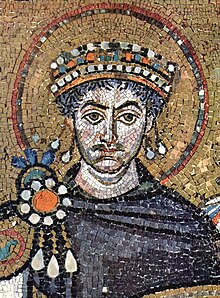Justinian I
Justinian I (/dʒʌˈstɪniən/) (Latin: Iustinianus, Greek: Φλάβιος Πέτρος Σαββάτιος Ἰουστινιανός) (c. 482 – 14 November 565), commonly known as Justinian the Great, was Eastern Roman Emperor from 527 until his death. He is considered a saint by Eastern Orthodox Christians. Justinian simplified Roman laws. These are now called Corpus Juris Civilis.
| Justinian I | |||||||||
|---|---|---|---|---|---|---|---|---|---|
 Detail of a contemporary portrait in the Basilica of San Vitale, Ravenna | |||||||||
| Roman Emperor of the East | |||||||||
| Reign | 1 August 527 – 14 November 565 (alone from August 1 527) | ||||||||
| Predecessor | Justin I | ||||||||
| Successor | Justin II | ||||||||
| Born | c. 482 Tauresium, Dardania, Eastern Roman Empire (near today's village of Taor, Republic of Macedonia) | ||||||||
| Died | 14 November 565 (aged 82) Constantinople, Eastern Roman Empire | ||||||||
| Spouse | Theodora | ||||||||
| |||||||||
| Dynasty | Justinian dynasty | ||||||||
| Father | Sabbatius | ||||||||
| Mother | Vigilantia | ||||||||
Reign
changeJustinian was born to a Illyrian peasant farmer family in 482 or 483 A.D. Justinian's uncle rose from humble beginnings to become a great general and then Emperor. Justinian was educated by his uncle, who gave him important jobs and appointed him as his successor. It was a wise decision. Justinian was astute, gifted, and ambitious. He modeled himself after the ancient Roman Caesars. After becoming Emperor in 527, Justinian worked to restore Byzantium to its former glory.
Justinian proved to be a strong and effective leader in many ways. He significantly enlarged the empire’s borders. Within those boundaries, he made significant advances in government, construction, and law. He reformed the Byzantine government in order to increase efficiency and eliminate corruption. Justinian also embarked on a large-scale construction project. He oversaw the construction of the Hagia Sophia, a church in Constantinople that is now regarded as a masterpiece of Byzantine architecture. He also supported numerous other civic projects in the city, including a magnificent new Senate building.
Justinian was a devout Christian who was actively involved in religious matters. He punished those found to be heretics, including Jews. He forbade Jews from erecting or reading the Bible in Hebrew, for example. Justinian also worked hard to reconcile the early church's differences of opinion. For example, different groups within the church held opposing views on whether Jesus Christ was fully divine (having the nature of a god) and should be worshiped as an equal to God. This disagreement persisted long after Justinian's death.
Justinian's legal reform was far more successful. He reorganized and standardized complicated Roman laws, and had the remaining laws written down clearly and logically in a single work known as the Code of Justinian. This remarkable work served as the foundation of European law until modern times.[1]
Other websites
change- The Anekdota ("Secret history") of Procopius in English translation. Archived 2013-10-11 at the Wayback Machine
- The Buildings of Procopius in English translation.
- The Roman Law Library by Professor Yves Lassard and Alexandr Koptev Archived 2012-08-31 at the Wayback Machine
- Lecture series covering 12 Byzantine Rulers, including Justinian Archived 2016-07-18 at the Wayback Machine - by Lars Brownworth
Justinian I Born: 482/483 Died: 13 November/14 November 565
| ||
| Regnal titles | ||
|---|---|---|
| Preceded by Justin I |
Byzantine Emperor 527–565 with Justin I (527) |
Succeeded by Justin II |
| Political offices | ||
| Preceded by Flavius Rusticius, Flavius Vitalianus |
Consul of the Roman Empire 521 With: Flavius Valerius |
Succeeded by Flavius Symmachus, Flavius Boethius |
| Preceded by Vettius Agorius Basilius Mavortius |
Consul of the Roman Empire 528 |
Succeeded by Flavius Decius, II post consulatum Mavortii (West) |
| Vacant Title last held by Rufius Gennadius Probus Orestes,Lampadius |
Consul of the Roman Empire 533–534 With: Decius Paulinus |
Succeeded by Belisarius |
References
change- ↑ "1.2 Justinian and Theodora". NGLSync. Retrieved 5 February 2023.